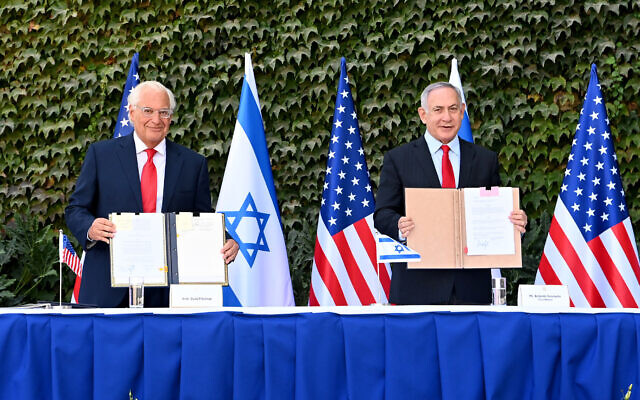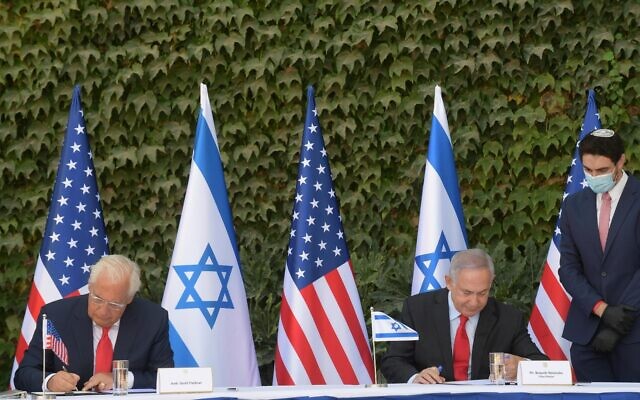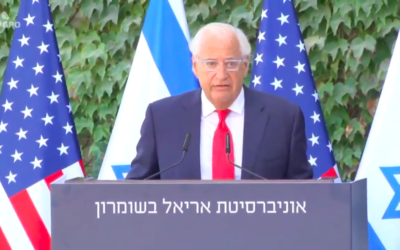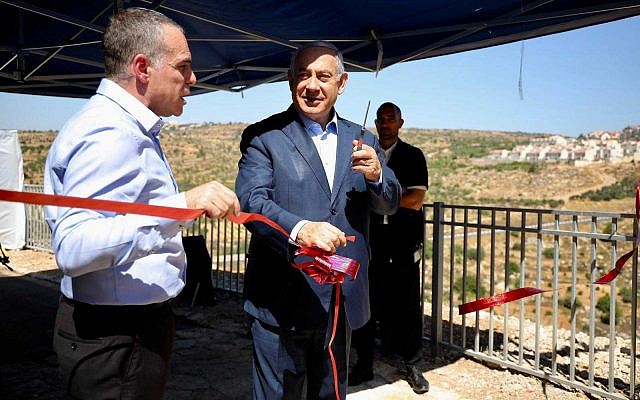PM fetes ‘important victory’ as US okays funding science projects in settlements
In move seen by some as precursor to future West Bank annexation, Washington removes geographic restrictions from three 1970s science cooperation agreements
Raphael Ahren is the diplomatic correspondent at The Times of Israel.

Israel and the US on Wednesday signed an agreement that removed all previous geographic restrictions from their scientific cooperation, a move viewed by some as a first step toward American recognition of Israeli sovereignty over the West Bank.
Prime Minister Benjamin Netanyahu and US Ambassador to Israel David Friedman signed a protocol that amended three 1970s agreements that form the basis for bilateral scientific cooperation.
Those agreements had stipulated that cooperative projects “may not be conducted in geographical areas which came under the administration of the State of Israel after June 5, 1967, and may not relate to subjects primarily pertinent to such areas.”
Wednesday’s amendments, signed during a festive ceremony at Ariel University, in the heart of the West Bank, removed this clause.
“It opens Judea and Samaria to academic, commercial and scientific engagement with the United States,” Netanyahu said, using the West Bank’s biblical names.
“This is an important victory against all those who seek to delegitimize everything Israeli beyond the 1967 lines. And to those malevolent boycotters, I have a simple message for you today: You are wrong, and you will fail. You are wrong because you deny what cannot be denied — the millennial connection between the people of Israel and the land of Israel; it’s over 3,000 years old,” he said.
“And you will fail because we are resolved to continue to build our life in our ancestral homeland and to be never uprooted from here again.”
Switching from English to Hebrew, the prime minister declared: “Today we’re applying the science agreement between Israel and US to Judea and Samaria and the Golan [Heights]. This is a tremendous change. It’s a victory over all the organizations and countries that boycott Judea and Samaria.”

Since their establishment in the 1970s, the Binational Industrial Research and Development Foundation (BIRD), the Binational Science Foundation (BSF) and the Binational Agricultural Research and Development Foundation (BARD) all limited their cooperation to Israel’s pre-1967 borders and would not grant funding to research and development projects in the West Bank, East Jerusalem or the Golan.
“Now, to be clear, these agreements were made with wonderful intentions and they have yielded outstanding results,” Friedman said at the ceremony. “But nonetheless, I was disappointed that these agreements devoted to academic and scientific growth were subject to political limitations that did not serve the goals sought to be achieved. These geographic restrictions no longer comport with our foreign policy.”
Under President Donald Trump, the US has recognized Jerusalem as Israel’s capital and Israeli sovereignty over the Golan. It has also reversed Washington’s longstanding position on West Bank settlements, arguing they are not necessarily violating international law.
“Plainly, this geographic restriction within these three agreements was an anachronism,” the US ambassador said. “We are righting an old wrong, and we are strengthening yet again the unbreakable bond between our two countries.”
Friedman recalled that he had initiated the removal of the “offending clause” from the agreement a year ago and that it involved a complicated interagency process. While it took a long time to obtain all the approvals necessary to amend the agreement, “there was no policy pushback from any sources,” he said.

The ambassador stressed that the US and Israel will continue to fund projects based on quality but will no longer refuse support for researchers because of their postal code. “We are depoliticizing a process that should never have been politicized in the first place,” he said.
Observers differed in their interpretation of Wednesday’s signing ceremony. Higher Education and Water Resources Minister Ze’ev Elkin, for instance, praised Netanyahu for a “great achievement in advancing [Israeli] sovereignty in Judea and Samaria.”
Eugene Kontorovich, an international law professor at George Mason University, called it a “historic international agreement [that] cements US policy that Israeli settlements are not illegal, and puts money behind it.”
He further said that Wednesday’s amendments were a “direct repudiation of UN Security Council Resolution 2334,” which in 2016 harshly condemned Israel’s settlement enterprise as illegal under international law.
“It will be increasingly difficult for the EU to maintain that funding such research projects violates any international legal consensus,” Kontorovich argued. “Finally, because this is embodied in a diplomatic agreement, it cannot be unilaterally changed by a subsequent American administration.”
Efrat Mayor Oded Raviv, a senior settlement leader close to Netanyahu, said the agreement showed that the US puts science and research over politics.
“By erasing the scientific and academic ‘Green Line,’ the Trump administration is expressing their recognition of the reality on the ground,” he said in a statement.
“Peace can only be made when we deal with reality and not fantasy. Today’s agreements are another fulfillment of the doctrine of peace for prosperity — the catalyst for peace will be when Israelis and Palestinians see each other as partners in the future,” he said.

Other analysts, including some identified with the pro-settlement movement, said such an interpretation was overstating the importance of Wednesday’s agreements. One disappointed pundit went so far as calling it a “consolation prize” for the suspension in August of Israel’s plan to unilaterally annex large parts of the West Bank.
BIRD, BSF and BARD — the three foundations on the basis of US-Israel scientific cooperation — have provided more than $1.4 billion to over 7,300 joint research and commercial projects, according to the US Embassy in Jerusalem.
In addition to the amendments, the US and Israel on Wednesday signed a Scientific and Technological Cooperation Agreement.
It establishes a new government-to-government framework that seeks to “elevate and facilitate activities in scientific research, technological collaboration, and scientific innovation in areas of mutual benefit,” the embassy said in a statement.
“Today’s signing of a new US-Israel Science and Technology Cooperation Agreement will further strengthen our relationship with Israel and lay the groundwork for future scientific breakthroughs,” said Kelvin Droegemeier, Trump’s adviser for science and technology policy. “Integrity, transparency, openness, reciprocity, and merit-based competition are at the heart of the American and Israeli research enterprises.”









